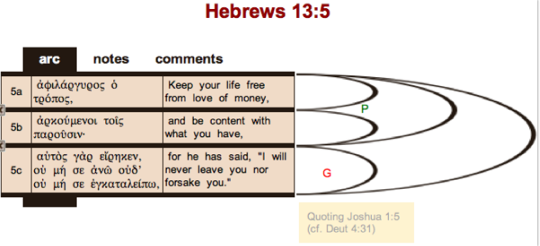Money, Stuff, and God Will Never Leave You
Hebrew 13:5 is one simple verse, but the argument is amazing. Readers of Scripture know that the love of money is dangerous (Matthew 6:24; Luke 16:13; 1 Timothy 3:3; 1 Timothy 6:10; 2 Timothy 3:2), but here the writer of Hebrews gives us more.
The two commands in verses 5a and 5b have an important connection. Both of the commands are positive: "keep your life free from love of money" and "be content with what you have." We can see that the "love of money" stands parallel to "what you have." So then, the commands for freedom and contentment are somehow concerned with our possessions.
Using Biblearc.com, I have represented the relationship between verses 5a and 5b to be a progression. The command to keep free from loving money (the potential to have more) progresses to the command to be content with what we have now.
This would be enough for us. But the writer goes on. He gives us a basis for this freedom and contentment.
Keep your life free from love of money and be content with what you have, for he has said, "I will never leave you nor forsake you."
The command for us to be free and content is grounded in the promise that God is always there. At this point, we press deeper into this text for theological reflection.
The basis of our freedom from loving money and our contentment with what we have is that God is always with us (stated negatively in the promise "I will never leave you").
So how is the presence of God related to money and our stuff? We can be free from wanting more and happy with what we have because we have God.
Freedom from loving money and contentment with what we have is based on the reality that we can always say "we have a better possession and an abiding one" (Hebrews 10:34). The LORD is our portion. Because of Jesus' death and resurrection for us and the awakening work of the Spirit, God has become our treasure. And he who is most desirable will never leave us. He will never forsake us.





